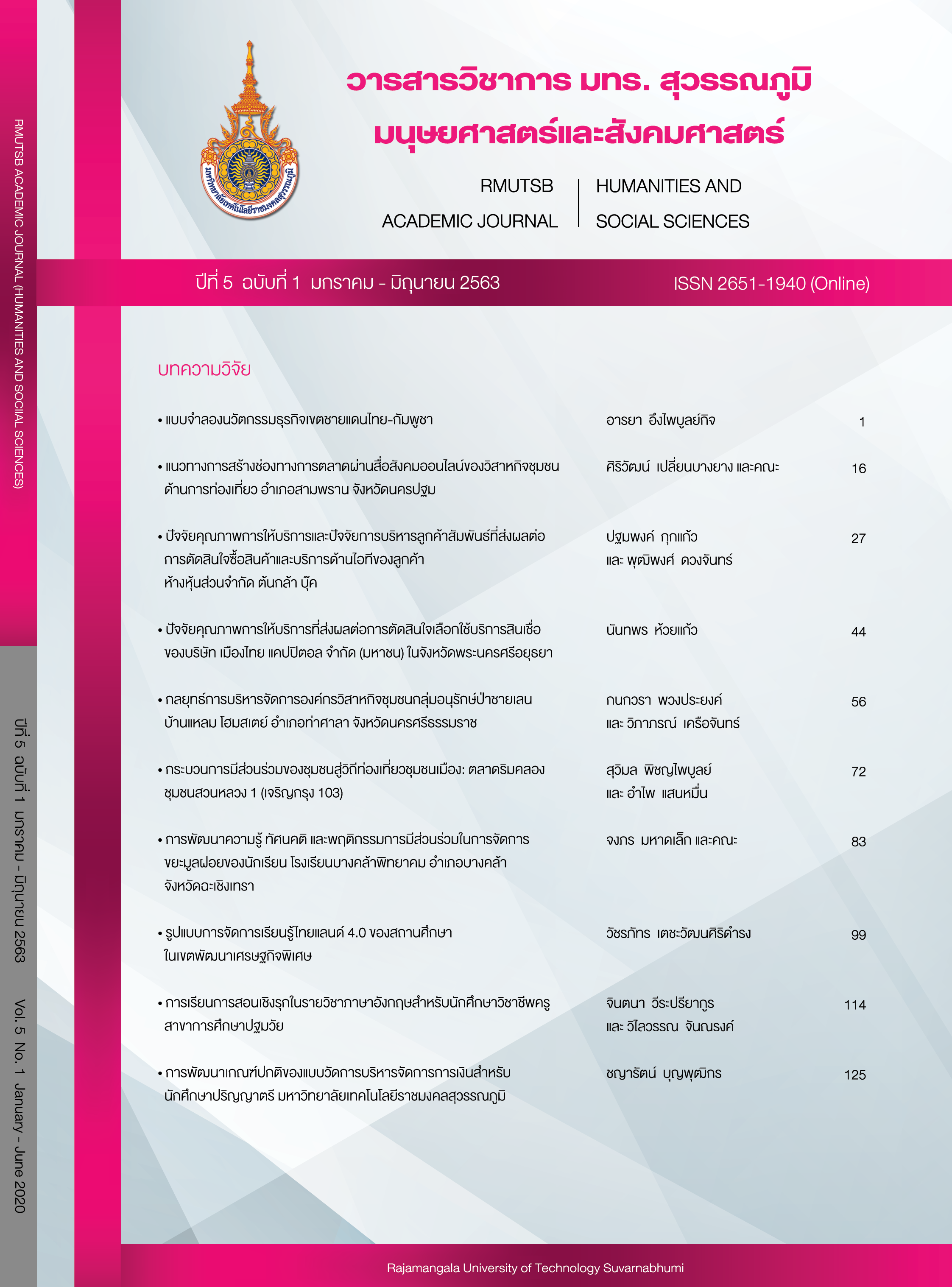Community participation towards the urban community tourism: Suanluang 1 Community Canal Market (Chareonkrung 103)
Main Article Content
Abstract
The research study of community participation towards the urban community tourism: Suanluang 1 Community Canal Market (Chareonkrung 103) is a socially - engage research. The problems in the community are focused in this study. qualitative, quantitative, participatory action research are employed. The aims of this project are to study the current state, and strength of the community, to manage sustainable tourism at the tourist sites, Suanluang 1 community, Bang Ko Lam, Bangkok, by using public hearing and focus group with community committee, and the people who would like to be the sellers. Quantitative data has been collected for 2 periods; before and after managing local community market Suan Luang as the tourist site.
Findings revealed that Suan Luang community 1 was a strong community in term of administrative management because of the unity of the committees, team working, and utilizing Information technology in communication. Furthermore, Islamic principle promotes mutual understanding and unity in the community. The physical characteristics of the community are also appropriated to be managed as a tourist attraction because of distinguished Isamic food, such as, Roya and Suyee. Cleanliness, tidiness, calmness, and easy access of the community are also the advantages. The community members are working cooperatively to develop their society; hence this community has been developed into the urban community tourism of Suanluang 1 (Chreongkrung 103) since September 2013 until now. It is considered sustainable development into the 7th year.
Article Details
References
Choibamroong, T. (2015). Strategies for creating value and increasing value of tourism by Thai urban communities to support the ASEAN economic community. Bangkok: National Institute of Development Administration. (in Thai)
Dangroj, P. (2001). Tourism industry to the 21st century. Bangkok: Rangsit University. (in Thai)
Krapanja, W. (2011). Ecotourism management model in Ban Ao Tha Lane Community Forest - Ban Tha Swamp, Khao Thong Subdistrict, Mueang District, Krabi Province (Master's thesis). Sukhothai Thammathirat Open University. (in Thai)
MGR Online. (2013). Bangkok launches Bangkok Green Community, creating environmentally friendly communities. Retrieved September 28, 2019 from https://mgronline.com/qol/detail/9560000053357
Pichayapaiboon, S. (2011). Development of strategic plan for social inequality: A case study of Suanlaung 1 community. Journal of Social Research, 36(1), 1-28. (in Thai)
Sritalanuchit, M., & Srisawannol, W. (2016). Ecotourism development of Wo Kaew community Hang Chat District Lampang. International Thai Tourism Journal, 12(2), 83-98. (in Thai)
Taweekul, P. (2001). People’s participation in the management of sustainable tourism: A case of Ban Lhai Hin, Tambon Lhai Hin, Amphoe Ko Kha, Changwat Lampang (Master's thesis). Chiengmai University, Chiengmai. (in Thai)
Tourism Council of Thailand. (2015). This trip is not the same with tourism by the community. Retrieved March 26, 2013, from www.thailandtourismcouncil.org (in Thai)
Sarobon, S. (2004). Tourism management by the community. Research Community, 10(57), 15-21. (in Thai)
Yuan, J. (2010). The research of sustainable development on tourism. Retrieved June 3, 2018 from https://www.researchgate.net/publication/233284803_Aesthetic_Values_in_Sustainable_Tourism_Development_A_Case_Study_in_Zhangjiajie_National_Park_of_Wuling_Yuan_China_meixuejiazhidezhongyaoxing-wulingyuanzhangjiajieguojiagongyuandekechixuluyoufazhan


